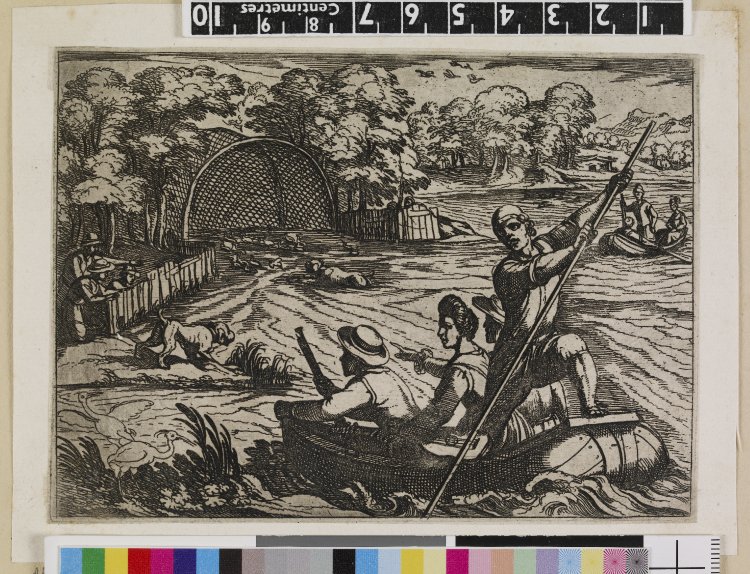 |
| Antonio Tempesta, 1598, "Hunters chasing wild geese into a large net" Source |
Teddy Moritz, who hunts her hawks, dachshunds and lurchers in New Jersey writes:
In my experience, ducks will 'toll' to any dog messing about in the bushes along a shoreline. It's their nature to be curious, some species more than others. My first miniature longhair dachshund taught me about tolling. She would run up and down along the shoreline of a lake, barking at the flocks of ducks, even swimming out a few feet and climbing back onto shore. The ducks would swim over to investigate but never close enough for her to catch, but certainly close enough to be shot. She was a red dog and having read the Nova Scotia Duck Tolling Dog info in books, I figured she was fox-like at least in color. Do ducks see color? I don't know but I do know that this dog's granddaughter, who is black and tan, can toll ducks, and even Canada Geese, by aggressively standing on a rock or log in the water and barking at the waterfowl. I mentioned this to a serious, long-time duck hunter from Long Island and he'd never heard of tolling. If my big, gray, shaggy lurcher wanders along the shoreline, the waterfowl all swim within a certain distance of him. Naturally I could say they think he's a coyote. To me, the waterfowl are just curious and come close to keep an eye on the dog. When the Canada Geese begin to set up nesting territories, they are very easy to toll, as are ducks. Mallards toll the easiest, other species are more spooky.
"Duck Tolling Dachshund" has a nice ring to it, eh? Maybe I'll get on the bandwagon and breed some for lots of $$$!!!
I love Teddy. And, of course, she is right -- any dog can do it (and even a fox too, apparently), but almost no one uses tolling anymore (including people who own Tollers) because wooden and plastic decoys are cheap and generally work much better.
 |
| This is Fitz, a tolling and retrieving miniture dachshund that weighs 6 pounds. Teddy Moritz is not a fantasy hunter! |
So what's the true history here? It's very old and not too well described most of the time.
In the world of duck hunting, slow-swimming dogs (all dogs are slow-swimming!) were first used to push wild ducks down narrow man-made channels cut into the banks of lakes and ponds. Small boats were also used for this purpose, as well as attractions such as floating duck feed, trained live ducks that lured wild ducks into the channels, and tolling dogs to attract curious birds.
Once the ducks were inside these channels, long nets on poles could be dropped on top of them. These duck channels, or "pipes," often had wattle fences along their sides, with this fencing helping to keep the ducks from flapping out from under the net and also from taking to flight too easily (ducks need room to take off).
Over on a poodle history web site I found old illustrations of all this, as well as some great explanatory text. Check it out! On the same web site they note:
The word "decoy" is an abbreviation of the Dutch word endekooy or "duck cage", into which ducks were driven...
For the record, I have written a bit about these narrow man-made channels in an earlier post entitled The Archeology of Hunting.
Of course, with the rise of fowling pieces and shotguns (starting around 1700) the netting of wild ducks declined, and with it any obvious need for dancing dogs. Today, the "Toller" breed, created this century, is mostly a companion animal and occasional retriever used in a conventional manner.
- Related Posts:
** Dances With Ducks
** A Bumper Sticker Can Tell You Quite a Lot
** Working Dachshunds: Very Useful in the Field
** Beyond Flights of Fancy
No comments:
Post a Comment